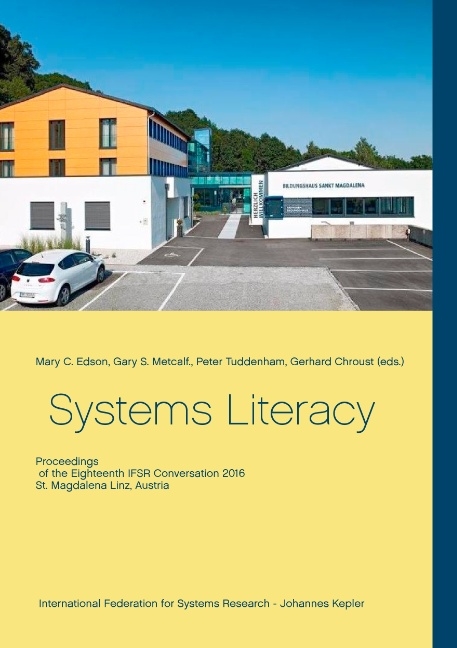
Systems Literacy
BoD – Books on Demand (Verlag)
978-3-7431-7913-4 (ISBN)
Gary S. Metcalf, PhD, is a faculty member at Saybrook, in the Department of Leadership and Management. He earned his BS in Education from North Texas State University in 1981 and graduated with a Master's degree in Social Work (family systems therapy) from the University of Texas at Arlington in 1985. He completed his PhD in Human Science (focused on Organizational Systems) from Saybrook University in 2000. Before transitioning to academic and consulting work, Gary worked as manager, for Ashland Inc. and for Tandy Corporation, both Fortune 50 corporations. In those roles, he provided coaching, counseling, and training to managers and employees, in an effort to create positive systemic change at individual and organizational levels. Gary has taught in distance education and online universities since 2001, primarily in MBA and doctoral programs. He has designed and taught courses, as well as serving on and chairing dissertation committees. He has authored numerous articles and presentations, and co-authored The Management of People in Mergers & Acquisitions (Quorum Books, 2001) with Dr. Teresa A. Daniel. His latest books include an edited volume titled 'Social Systems and Design', published by Springer in 2014, and his work with a team in publishing 'A Guide to Systems Research', published by Springer in 2016. He is active in a number of professional organizations, currently serving as Vice President (and past-President) of the International Federation for Systems Research (IFSR) based in Vienna, Austria. He was President of the International Society for the Systems Sciences (ISS) for the 2007-2008 term. In addition to his work in academia, Gary is President of Interconnections, LLC (www.interconnectionsllc.com).
Peter D. Tuddenham is the Vice President for Systems Education for the International Society for Systems Science (ISSS). In 1991 he co-founded the College of Exploration, an online learning platform focused on bringing cutting-edge discoveries to education at all levels, which has reached over 15,000 students globally. He was co-organizer of the U.S.A. Ocean Literacy and Earth Science Literacy projects. Currently as Managing Director of CoExploration Limited in the United Kingdom he is a participant in a pan-European multi-partner Horizon 2020 project on Ocean Literacy in Europe. Previously he was Chief Learning Officer for Metasystems Design Group and adjunct faculty at George Mason University for Distance Learning. As a Senior Systems Research Scientist at the Allen Corporation, later CAE-Link, he researched cognitive and affective development for executive development in the U.S. Army and as part of that work served as guest faculty at the U.S. Army War College for Creative Problem Solving. He was Strategic Issues Manager for Arizona Public Service, Corporate Communications Systems Manager for Coors Brewing Company, and before moving to the USA in 1980 he was an Engineer Officer in the British Army's Royal Corps of Engineers where he served in Germany, USA, and Northern Ireland. He studied Systems Design towards a Ph.D with Bela Banathy at the Saybrook Institute and Systems Behaviour at the Open University. He has a BSc in Business Administration from Regis University in Denver. In the 2016 IFSR Conversation he was the coordinator and mentor of the overarching theme "Systems Literacy" which could be defined as understanding one's model or models of and how our individual and collective actions influence Systems behaviors and how Systems behaviors influence us.
Gerhard Chroust is an Austrian systems scientist and Professor Emeritus for Systems Engineering and Automation at the Johannes Kepler University of Linz, Austria. He is the Secretary General of the International Federation for Systems Research (IFSR), Editor-in-Chief of the IFSR Newsletter and Co-editor of the Proceedings of the Fuwschl/IFSR Conversations since 1994. He is a Board Member of the Austrian Computer Society (OCG), an Honorary Member of the Austrian Society for Informatics (ÖGI) and of the Bertalanffy Center for Study of Systems Sciences (BCSSS) and member of several scientific organisations. Chroust is an authority on formal definition of programming languages, system development processes, software quality standards, process assessment, and on cultural differences in system development. His current key research is in Human Aspects, Cultural Differences and Systemic Aspects of System Development and Disaster Management, and Representation and Enactment of Software Processes. 1964 he received a Master of Science (Electrical Engineering ) from the Technical University, 1965 a Master of Science (Computer Science) from the University of Pennsylvania. In 1975 he was awarded a PhD (Computer Science) from the Technical University Vienna and in 1980 a Habilitation (Computer Science) from the Johannes Kepler University Linz. From 1966 to 1991 Chroust worked at the IBM Laboratory Vienna. From 1992 until 2007 he was tenured Professor for 'Systems Engineering and Automation' at the Kepler University of Linz. He has published 10 authored books, edited/co-edited approx. 60 proceedings, written approx. 220 scientific publications and approx. 300 other publications. Chroust is bearer of the Silver Medal of Honor of Upper Austria. Website: http://www.gerhard-chroust.at
Mary C. Edson currently serves as President of the International Federation for Systems Research (IFSR). Previously, she served as Vice President of the Executive Committee for the IFSR. In this capacity, she has been project manager for the biennial Conversations in 2014 and 2016. Mary also leads the Systems Research Team, acting as editor and project manager for the team's recent publication of A Guide to Systems Research: Philosophy, Principles and Practice (Springer, 2017). Mary is dedicated to supporting the advancement of the community of systems sciences scholars and practitioners through developing educational programs in collaboration with the IFSR's member organizations, such as the International Council on Systems Engineering (INCOSE), the International Society for the Systems Sciences (ISSS), the Bertalanffy Center for the Study of Systems Science (BCSSS), the American Society for Cybernetics (ASC), and others. Mary is a systems scientist whose interests include fostering Systems Research and Systemic Practice, especially development of team systems theory and its applications, building adaptive capacity, cultivating project leadership, and enhancing organizational resilience. Mary is President of Equipoise Enterprises, Inc., a consulting firm specializing in Organization Development using systemic approaches. She has worked in information systems as a project manager for Fortune 500 companies and several small businesses. She holds a doctorate in Organizational Systems from Saybrook University.
| Erscheinungsdatum | 24.02.2017 |
|---|---|
| Reihe/Serie | Proceedings of the IFSR Conversations ; 18 |
| Sprache | englisch |
| Maße | 148 x 210 mm |
| Gewicht | 161 g |
| Themenwelt | Schulbuch / Wörterbuch ► Lexikon / Chroniken |
| Schlagworte | 21. Jahrhundert (2000 bis 2100 n. Chr.) • General Systems Theory • IFSR • Nachschlagewerke, Informationswissenschaften und I • Systems Literacy • Systems Sciences • systems thinking |
| ISBN-10 | 3-7431-7913-X / 374317913X |
| ISBN-13 | 978-3-7431-7913-4 / 9783743179134 |
| Zustand | Neuware |
| Haben Sie eine Frage zum Produkt? |
aus dem Bereich


